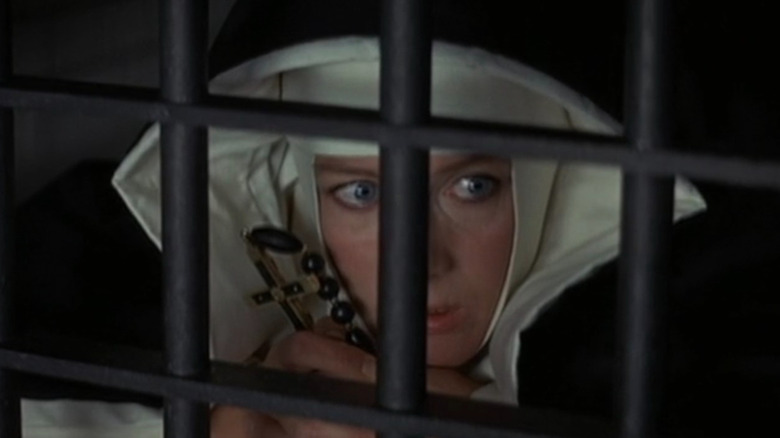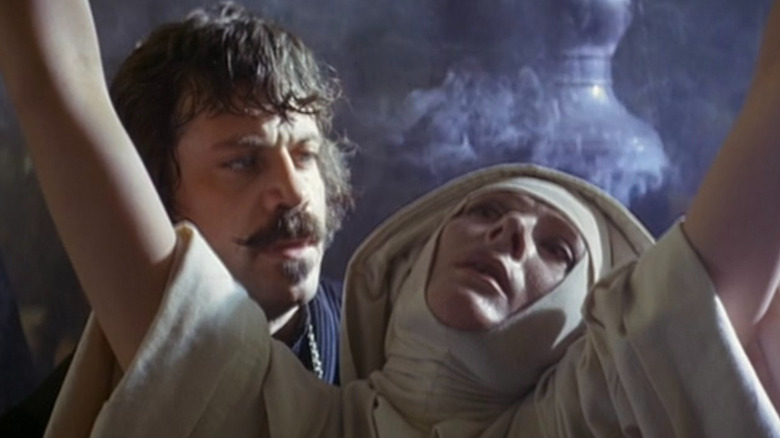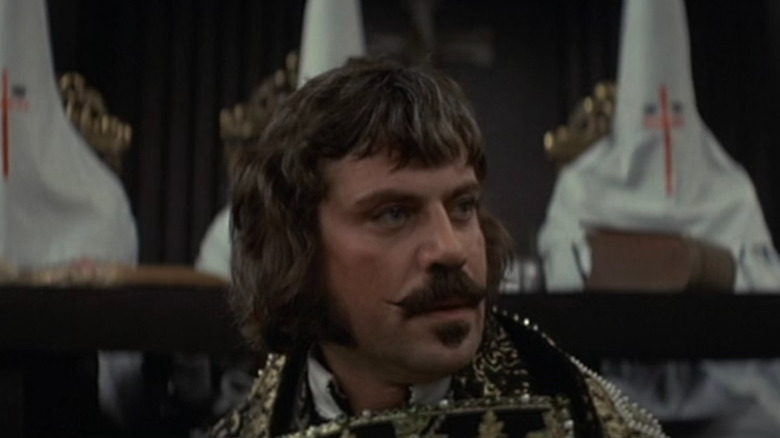This Controversial '70s Horror Movie Is One Of The Most Provocative Films Ever Made
In 1971, Warner Bros. was marred by controversy in the wake of unleashing "A Clockwork Orange" upon the world. The outrage over Stanley Kubrick's adaptation of Anthony Burgess' dystopian novel was so widespread that it led to the film being banned in the U.K. for over 26 years. Since then, "A Clockwork Orange" has not only gone on to become a culturally recognized masterpiece, it's also had the privilege of a 4K restoration. But would you know that earlier that very same year, Warner Bros. distributed an equally provocative masterwork that hasn't been granted nearly enough grace? Any act of contemporary studio bravery is child's play compared to the storm that came with greenlighting Ken Russell's "The Devils."
The famed British filmmaker built a career out of bringing such idiosyncratic works as "Tommy," "Altered States" and "The Lair of the White Worm" to the screen, but "The Devils" is by far Russell's most provocative film. It's a frighteningly timely dramatization of a bizarre moment in 17th century France when the Roman Catholic priest Urbain Grandier (Oliver Reed) was put on trial after a collection of Ursuline nuns claimed he was responsible for allowing the Devil to possess them through their sexual urges. At the forefront was the repressed Sister Jeanne de Agnes (Vanessa Redgrave), who bolstered the claim in spite of having never met the handsome priest prior.
Based on Aldous Huxley's non-fiction book "The Devils of Loudun" and John Whiting's stage play, "The Devils" is an audacious and transgressive accounting of the frenzy that transformed Loudun into a psychosexual circus of political corruption. Russell's film still feels dangerous more than five decades after its release, and it's infuriating that we don't talk about it nearly enough.
The Devils is a transgressive hotbed of sex, religion, and political malfeasance
Horror can take many forms, and here, it materializes with a blasphemous intermingling of desire, religion, and political hypocrisy. Only in the '70s could one of the major studios release a film in which a nun penetrates her hand with a crucifix as a way to capture the orgasmic sensation of the nails that went into Jesus Christ. Redgrave is hypnotic as Mother Superior, who can hardly conceal her lust. At one point, Jeanne overhears two women talking about how the holy father of Loudun is "well worth going to hell for," and it's more than understandable. Grandier is one of the most underrated hot priests in film history, as Reed's thespian performance is as rapturous as the mustache on his face. The smoldering charmer has no qualms about being labeled a proud philanderer, but he can't stand the notion of taking credit for Satan's impropriety. We know he speaks the truth, yet we can't help but see the flames he's destined to bathe in.
You can see echoes of "Black Narcissus," "Metropolis," and "The Passion of Joan of Arc" all throughout "The Devils," especially in its expressionistic production design. The psychological horror drama stands as one of the most unique looking movies you'll ever see, with then-production designer Derek Jarman transforming 17th century France into an anachronistic setting that feels out of time and space. Within the towering, plague-infested walls of Loudun is a hysteric frenzy posing as possession, which players like Cardinal Richelieu (Christopher Logue) and the John Lennon-esque Father Barre (Michael Gothard) knowingly warp to enact their own power grabs. Russell isn't attacking religion itself so much as the bureaucracy that would be so threatened by a leader like Grandier.
The Devils has been long overdue for a restoration and physical media release
"The Devils" was hit with an X rating upon its release in both the U.K. and the U.S., which led to two of the film's most critical scenes being cut. One of these is the infamous "R*** of Christ" sequence where the nuns defile all manner of religious iconographies in an all-out orgy of flailing bodies. Luckily, the footage still exists thanks in part to film critic Mark Kermode, who uncovered and subsequently had it included as part of Paul Joyce's 2002 documentary special "Hell on Earth." It speaks volumes on Warner Bros.' behalf that Linda Blair's graphic usage of a crucifix in "The Exorcist" from two years later is considered perfectly acceptable, while this isn't.
I also find it incredibly disheartening that "The Devils" has often been at the behest of flagrant acts of censorship. The film doesn't have a proper physical media release in the U.S., with its most prominent means of availability being a DVD put out by the British Film Institute in 2012 that still only features the truncated version. "The Devils" sometimes peeks its head out on streaming services like the Criterion Channel or Shudder for a short while, only to disappear back into the Warner Bros. vault, and that really sucks. It's outrageous that one of the most important and visually striking movies of the '70s isn't readily available. Restoring "The Devils" is a cultural necessity that would right a long overdue wrong towards an undisputed masterpiece.
If the nuns of Loudun can stand courtside in that terrible "Space Jam" sequel, then there's no reason why "The Devils" can't be handed over to the folks at the Criterion Collection or Arrow Video.


